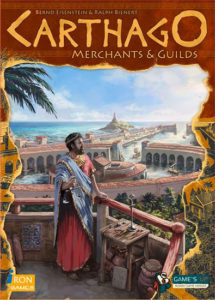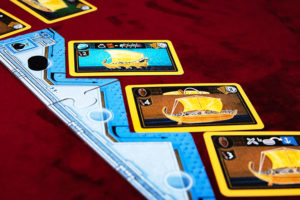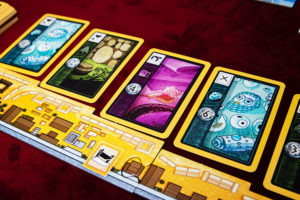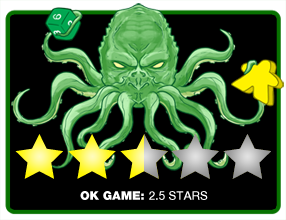 In Carthago: Merchants and Guilds players will attempt to become the most influential trader in the Phoenician city of Carthage. Players use multi-use cards to perform actions, trade goods, and spend money in the guilds to increase both their trading and prestige.
In Carthago: Merchants and Guilds players will attempt to become the most influential trader in the Phoenician city of Carthage. Players use multi-use cards to perform actions, trade goods, and spend money in the guilds to increase both their trading and prestige.
Carthago is an action selection game for 2-4 players. It scales for player count well and feels very similar with any number of players. Carthago typically lasts from 45-60 minutes.
Gameplay Overview:
Throughout the entire game of Carthago you will play three rounds of five actions each. Those actions are taken and paid for with multi-use cards. Each trade card shows one of the five actions, one of five possible goods, and some number of coins. The object of the game is generally to have as much presence in the guilds and acquire as many ships as possible, as the product of those two numbers will make up most of your scoring.

Players also start that game with three influence markers available and many more on their personal residence board. Goods can be spent to clear some of the influence markers from your board, increasing your scoring or strength in wartime while also giving you additional influence markers. These markers are incredibly important as they are placed temporarily in the docks to acquire ships or permanently in the guild house or on achievement tiles for end game scoring.
At the beginning of the game players have only their base cards (which show an action, but no goods or coins) and three random trade cards. The available actions include:
- Market: Allows you to draw a trade card from the five face-up cards and then exchange one in your hand for another card in the market.
- Residence: Spend goods to remove influence markers off of your residence board and into your supply.
- Trading Dock and Warship Dock: Place an influence marker in the corresponding dock.
- Harbor Delivery: Resolve one of your influence markers from the trading dock and/or warship dock.
When you resolve the trading dock you simply pay the good card that corresponds to the ship’s type. You will receive trade cards showing coins up to the ship’s value and place the ship next to your board. For warship docks, you will randomly draw the top card of the ship deck and compare its strength to yours. If you meet or exceed its strength you will receive trade cards in the same fashion as the trading dock. Each ship you acquire also includes a special power that you can activate.
The action board in the middle of the table shows the last taken action for each player. When you take an action you must play a card showing that action and move your marker to the corresponding space on the action board. If other players also have their marker there you must discard an additional card (of any action) for each other player there. These cards will be returned to you at the conclusion of the round, but you must make sure you don’t run out of cards to take actions mid-round.
There are also two guild markers that rotate around the action board. If a guild marker is on the action you are taking you can additionally take a guild action after your main action. The guild action allows you to pay coins to place influence on either the guild house or one of the achievement tiles which give you special requirements for end game scoring. After three rounds, the player with the most points is the winner.

Game Experience:
When set up on the table, Carthago has a pretty intimidating presence. There are a lot of different boards and cards that take up a good sized portion of your gaming table. But once you wrap your head around how it works and get through the explanation, it’s deceptively simple. The box advertises a 60-90 minute play time but experience players can finish in less than an hour in many cases.

That simplicity comes at a cost though. You only get to make 15 action choices throughout the entire game and in many cases the success of those choices will come down to some random elements. Resolving the warship dock is the most egregious example, as the strength of the ships range from 1 to 6, but players can only have 1, 3, or 5 strength. You can never be absolutely sure you can win a fight—unless you have ships whose special power is to increase your strength. Considering the number of ships you have at the end of the game is multiplied by your influence in the guild hall to make up the bulk of your victory points, it can make or break how your game goes.
Not only does winning a fight give you the ship, but you also get trade goods equal to the value of the ship. Losing puts you even further behind as you need those cards potentially as goods for the residence action or coins for the guild actions. At the very least, resolving the warship adds a bit of tension into the game. The actions are otherwise fairly mundane. There are few opportunities to create any efficiencies and making more out of your actions than other players — other than hoping you get a lot of cards (and hopefully ones with matching goods) from successful ship resolutions.

The trade dock mechanism is my favorite part of Carthago. When you claim a dock, you aren’t reserving a specific ship necessarily, as the ships could move if someone takes the harbor delivery action and moves a ship in front of yours, as all ships will move down the line. So there is almost a bit of a bluffing game especially at the higher player counts on when someone will claim a ship. Often you will place your influence disc in the dock ahead of the ship you actually want, expecting it to move down by the time you have a chance to claim it.
One final mention on the multi-use cards—while they certainly do have three separate functions you almost always care primarily about what type of good it is. Never in my plays did I care what the action was on the trade card I was taking with the market action. Sometimes the coins factored in to my decision, but normally only if the goods were the same or equivalent. This was exceptionally disappointing as multi-use cards are one of my favorite components in games but they don’t quite have the same feeling in Carthago.
Final Thoughts:
Games with a small number of decisions are often described as a knife fight in a phone booth. The idea, obviously, is there isn’t a lot of time or even room to be all that fancy, but the implications of each and every choice can be devastating. Carthago feels a bit more like a game of tag in a phone booth. The decisions don’t pack quite enough of a punch for me to want to break this one out very often.
If you want to try it out the price point is reasonable and it plays similar at all player counts. If you are looking for a mid-weight euro you could certainly do worse than Carthago. But, you can probably find something with a more interesting theme or more meaningful decisions.
Final Score: 2.5 Stars – Feels a bit middle of the road in every sense. Nothing really stands out and grabs you.
 Hits:
Hits:
• Quick playing and scales well from 2-4
• Top notch production quality.
Misses:
• Plenty of randomness that swing your success wildly.
• Multi-use cards are rarely used for actions, negating one of their uses.
• Cathago’s actions aren’t particularly interesting and the decisions are fairly straightforward.























I happen to disagree pretty wildly with your review of Carthago.
1. You complain about the level of randomness. There are really only two elements of randomness at any given time: the cards in the market (which you can wipe before using the market action) and the warship flip. The former can affect things, sure, but that is true of any game with a revolving market of cards. You should adapt your strategy around what is there, not what you wish would appear. There are plenty of ways to use the cards, not the least of which is for their monetary value to gain seats and achievements with Guild interactions. The warship is a gamble, but you know going in where you stand. If you’re going there with just 1 attack, you should know you aren’t likely to win. Not focusing on attack this game? Use the cards with that action as your discards when going onto a shared space on the action selection board.
2. You mention that the multi-use cards were only really used for their good type when you played. That is a player problem, not a game problem. They have three uses for a reason, and the monetary value is arguably as important, if not more important, than the type of good. The action on them is very valuable given that you may end up needing to discard 5+ cards over the course of a turn if your opponents are using the same actions you want. The action on those cards enables you to reclaim those valuable actions, or to discard them this round so they return to your hand for use in the next round.
3. You claim the actions are not interesting and the decisions are straight-forward. I’m not sure what game you were playing, but I almost always have agonizing decisions and, from the outset, have several paths I could pursue with strategy. This game has a bit of efficiency/engine building, and there are plenty of times that a player is attempting to set themselves up for future turns with the early decisions in a round. Yes, putting a disc on the harbor is a simple turn. But it sets you up for critical actions later in the round when you fulfill the contract on a boat and, potentially, also fight off a warship. Being able to do both of those with one action is huge, but it requires planning in advance so you can do both and do them effectively. Choosing which of your rows to try and clear is another important decision, as they each open up different rewards that should help you determine your focus for the 15 actions you get. The rotating of the Guild means you need to know when to use them, make sure you have the resources to take advantage of being on a space with them, and remain aware of what your opponents are doing. The competition for seats on the board, as well as the milestones for each age, add even more decisions to the game and are critical choices as you progress (especially since seats will get more expensive and the milestones can only be placed while in the correct age).
I, for one, have thoroughly enjoyed my plays of Carthago so far and find it to be a far better game than you present here.
Glad you enjoyed it, I’m a big believer that people can have different feelings about the same games.
In general, I find the competition for some of those achievement spaces is often lacking. And the price of discarding cards to use an action where other player(s) are is pretty low. There are definitely cases where the action on the cards you acquire matter, but its not frequently.
Again, there are decisions to be made, but the difference between your best option and your 2nd best option is often nothing-to-very little.